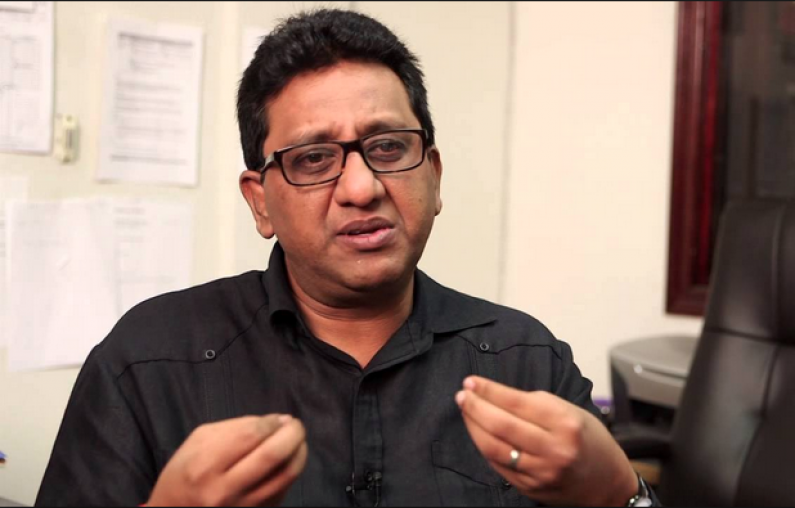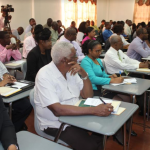
Two weeks after declaring that the US Government has full confidence in Guyana’s leadership with the visit of three Secretaries of State in four years, Guyana’s Attorney General Anil Nandlall is now firing off at the US Government over its latest International Drug Control Strategy Report, which was released by its State Department on Monday.
The report flagged the law enforcement agencies in Guyana for corruption and bribery, and highlighted nepotism in the public sector and political entities as complicating the fight against money laundering and narco trafficking.
The report described the Guyana Police Force as a “weak link” in the fight against money laundering, while noting shoddy investigations and a lack of adequate prosecutions.
In a response to the report on Tuesday night, Attorney General Nandlall demanded evidence of corruption among public officials.
He said any statement linking money laundering to corruption amongst public officials, must be substantiated by empirical/anecdotal evidence.
Mr. Nandlall stated that in many of the cases, proportionate and appropriate actions were taken against the individuals, noting the ongoing case against former Assistant Commissioner of Police, Calvin Brutus.
Mr. Nandlall said for the report to attempt to link money laundering to holders of public offices and corruption without citing the cases which have led to this conclusion, is “simply speculative”.
“Guyana has repeatedly demonstrated its intolerance to corruption, especially relating to public officials, once the evidence is made available. Guyana has won the Best-Case Award in the Caribbean region for its efforts in fighting money-laundering and anti-corruption, particularly in relation to actions taken against former Assistant Commissioner of Police Calvin Brutus”, Nandlall declared.
He noted the 2024 sanctions by the US Government of Guyanese of the Mohameds and their companies and the Government’s disengagement of doing business with them. Mr. Nandlall said information that was passed on to the Guyana Government has since been forwarded to the relevant agencies to conduct full investigations.
Permanent Secretary Mae Thomas was also sanctioned by the US Government over bribery and other claims. She remains on administrative leave and it’s unclear what probe is being conducted of the claims against her by the US Government.
The Attorney General said he is both surprised and disappointed with the information contained in the US State Department report.
Mr. Nandlall noted recent appraisals of Guyana’s anti-money laundering regime and it being given a “clean bill of health” by the Caribbean Financial Action Task Force.
He said there is no need for one to speculate in relation to Guyana’s Anti Money Laundering credentials, since those were recently scrupulously examined over a period of 18 months, in a mutual evaluation exercise conducted by “the most premier regulatory body in this hemisphere – the Caribbean Financial Action Task Force (CFATF)”.
On the issue of lack of convictions in money laundering cases, Mr. Nandlall said it is common ground that Government has no control over the determination of cases
by the Judiciary, noting that the Government adheres strictly to judicial independence and the doctrine of separation of powers.
He said the anti-money laundering structure can ensure that the matters are
investigated, charges are filed and evidence presented, but there is no control in respect of the determination of these matters.
Mr. Nandlall said since the Government took office in 2020, the volume of investigations and charges have greatly increased, noting that there are currently 298 money laundering charges with one conviction obtained.

The Attorney General said given that money laundering matters are complex and usually involve detailed financial analysis and reporting, it is not unusual for cases to take some time to be completed, especially given the importance of ensuring that money laundering is prevented.
In his statement, he also noted that in Guyana, Law enforcement has also been using tools related to combatting money laundering, such as freezing, restraint and asset forfeiture, to ensure that assets are not disposed of or dissipated by charged and or accused persons, and upon conviction, these assets can be made available to the State to further improve the crime fighting capabilities of the country.
On the issue of drug trafficking, Mr. Nandlall said the Customs Anti-Narcotics Unit has been involved in making some of the larger drug busts between 2024 and this year, adding that there has also been increased training for staff and personnel in law enforcement and the Office of the DPP.
The US Report noted that money laundering in Guyana has grown into a systemic issue involving both public officials and private citizens and is often linked to corruption and organized crime.
“Guyana’s vulnerabilities stem from the relatively small financial sector and limited regulatory resources that make it challenging to enforce stringent AML measures effectively. Guyana’s most recent anti-money laundering/combating the financing of terrorism (AML/CFT) national risk assessment (NRA) was finalized in July 2021, and Guyanese officials rated Guyana’s money laundering risk as medium high,” the State Department noted.
According to the U.S, the local gold mining sector continues to be a contributor to money laundering, explaining that gold smuggling in Guyana often facilitates money laundering, as persons would use illegal gold sales to disguise illicit funds and bypass regulations.
It said, in the mining sector, money laundering methods include large cash deposits using forged agreements of sale for non-existent precious minerals as well as cross-border transport of concealed precious metals to avoid payment of the relevant taxes and duties.












You must be logged in to post a comment Login